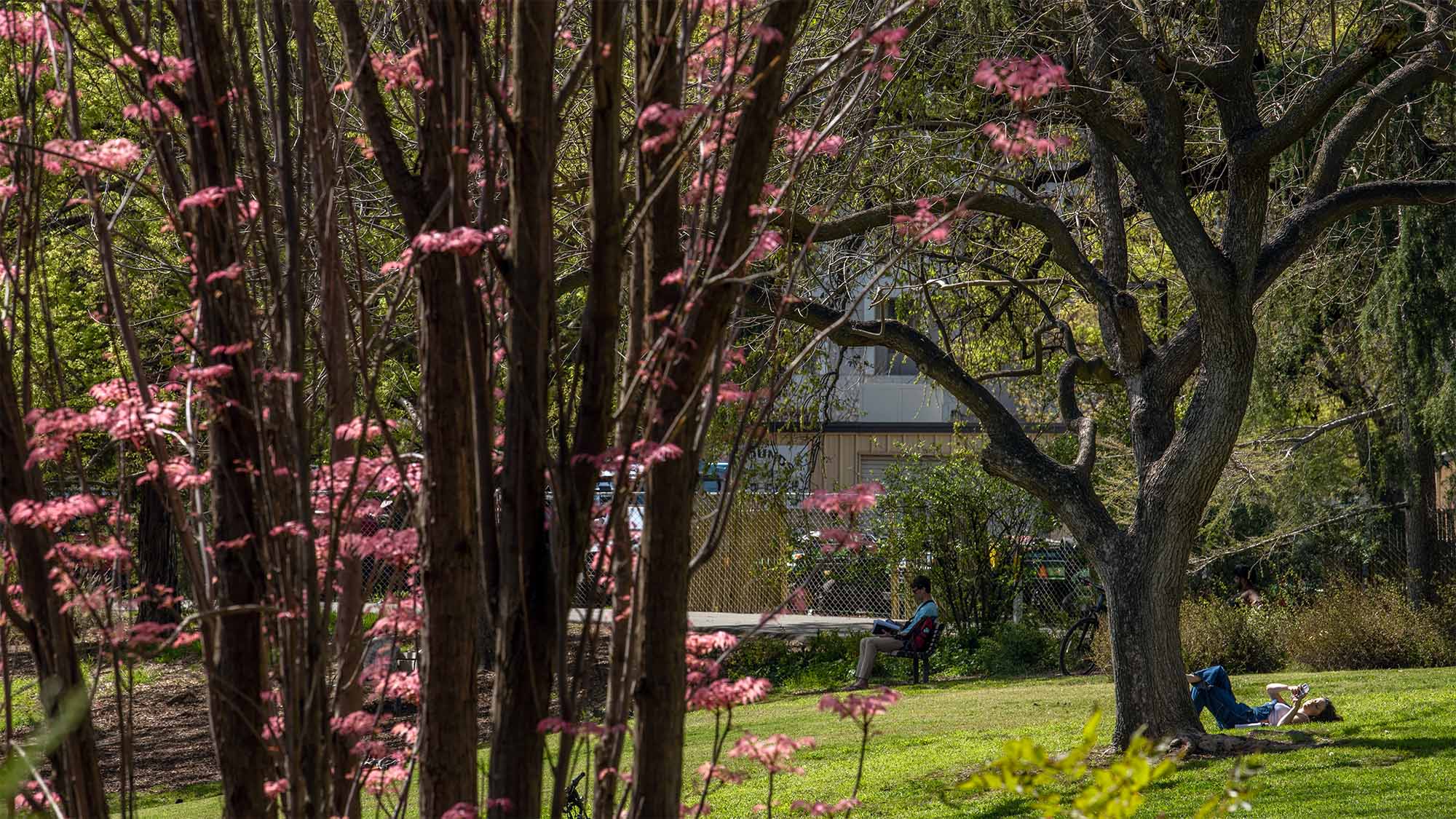Grand Challenges at UC Davis is making significant progress in its fight against the world’s “wicked problems,” including an expansion of its leadership team and funding for new research centers.
Paul Dodd joined Grand Challenges in December as associate vice chancellor in the Office of Research, working alongside Vice Provost Jonna Mazet.
Together Dodd and Mazet are advancing the campus’ transdisciplinary collaborations, strategically uniting and catalyzing the university’s strengths around the world’s wicked problems. The initiative has a rapidly growing list of achievements that bolster the university’s recognition and impact in the four challenge areas of Climate Solutions, Sustainable Food Systems, Reimagining the Land-grant University and Emerging Health Threats.
Dodd specializes in developing and supporting interdisciplinary academic relationships and building external research partnerships with industry and other organizations. He was previously with the UC Davis Office of Research from 2012 to 2022 and rejoins after two years with University of Galway, Ireland, where he was vice president of engagement.
“It’s truly a great privilege to take up this exciting role working with Vice Provost Mazet and the Grand Challenges team. It’s great to be back at Davis. I’m very appreciative of this opportunity to further amplify UC Davis successes,” Dodd said. In this new role, Dodd is uniting the efforts across the Grand Challenges with the UC Davis Office of Research and Office of Global Affairs.
Climate and health progress
Among Grand Challenges’ four focus areas, Dodd will oversee activities within the Climate Solutions and Emerging Health Threats challenge areas. On May 13, Climate Solutions celebrated a resounding success when the U.S. Department of Transportation awarded UC Davis a Climate Change and Transportation Center, to be led by Kari Watkins, professor of civil and environmental engineering at UC Davis and affiliate of the UC Davis Institute of Transportation Studies. The award, which will total up to $7.5M over three years, will make UC Davis the home base for the only national transportation center focused on climate change.
Grand Challenges assisted with the funding proposal for the center, which will be called the Center for Emissions Reduction, Resiliency, and Climate Equity in Transportation, or CERRCET.
“I am overjoyed at the chance to lead a center focused on simultaneously reducing the climate impacts of transportation while also thinking about mitigating how the climate disaster is already affecting our travel,” Watkins said. “In addition, we have purpose-built the equity implications of climate impacts and solutions into all the projects we will conduct through the center.”

The Emerging Health Threats challenge area is also celebrating recent successes, particularly through Grand Challenges’ Institute of Pandemic Intelligence, or IPI, which was founded through a $1 million award supporting the “Establishment of a Future Pandemic Prevention and Response Institute at the University of California, Davis,” from the Health Research Services Agency. In early May, IPI published a Pandemic Preparedness Roadmap in partnership with Healthy Davis Together and the Bay Area Global Health Alliance.
The roadmap takes lessons from the COVID-19 pandemic response to create strategic priorities and recommendations for a reimagined public health infrastructure that includes effective and equitable pandemic preparedness and response systems.
“We hope this tool will effectively assist planners at the local level and policymakers at the national and global levels to create cross-sector preparedness and response plans to emerging health threats,” said Molly McKinney, chief of staff for Grand Challenges.
Insights from the Pandemic Preparedness Roadmap are timely given the ongoing outbreak of H5N1 influenza. Following the release of the roadmap, Grand Challenges partnered with the School of Veterinary Medicine on May 16 to host an Emergency Virtual Consultation to assemble expertise around H5N1 influenza and focus on a One Health approach for emergency response, an event that reached over 600 individuals worldwide.
“The convening power of UC Davis — given our campus expertise in agriculture, veterinary medicine, engineering, data science, and of course public health — is a powerful tool for engaging with state and federal agencies and the diversity of stakeholders needed to address these health emergencies,” said Christine Johnson, professor of epidemiology and ecosystem health at UC Davis and director of the IPI. “The emergency consultation model was very effective for bringing together the leading scientists, frontline responders and decision makers to share best practices, insights, and next steps for H5N1 influenza control.”
Grand Challenges will use the policy recommendations from the consultation speakers and panelists, as well as audience feedback, to produce a policy brief. The brief will advocate for public health infrastructure, interagency collaboration from county to federal levels, and additional support to apply a One Health approach to better prepare for and address emerging health threats, such as H5N1 influenza.
Investing in relationships

In all of the Grand Challenges areas, significant advancements have been made in building strategic partnerships, internally at UC Davis and externally across the region, state, and country. “UC Davis is unique in both the diversity of its active collaborative networks and the amazing breadth of disciplines represented across our 11 schools and colleges,” Mazet said. “Arguably, there is no other university in the world capable of bringing as many experts to the table for positive impact on the world’s most wicked problems. We are now seeing the proof of our potential through the powerful partnerships addressing the Grand Challenges.”
The Reimagining the Land-grant University challenge area, or RLGU, represents the effort of UC Davis to reckon with our history as a land-grant university, recognize and center Indigenous peoples and the Indigenous homelands the university occupies, foster relationship-building with Indigenous peoples, and continue to build meaningful relationships with the diverse publics that the university aims to serve. Action in the challenge area is guided by Megon Noble, senior strategic advisor to the provost and repatriation coordinator for UC Davis; Michelle Villegas-Frazier, director of Strategic Native American Retention Initiatives at UC Davis; and Beth Rose Middleton-Manning, professor of Native American studies at UC Davis.
Noble, Villegas-Frazier, and Middleton-Manning are working to develop and expand trusting and meaningful relationships with local Native Nations. The team has been building the campus infrastructure to better position UC Davis to support Native relations, which includes facilitating the engaged campus community, organizing Native American Coordination meetings with UC Davis leadership, educating the campus community on the history of the “land-grab” and land-grant university, expanding awareness of Patwin homeland history, and advocating for increased staff focus on Native American affairs. Grand Challenges has launched a working group for Reimagining the Land-grant University to create a space for the UC Davis community to explore topics related to land-grant history, impacts and solutions.
”Reimagining the Land-grant University aims to acknowledge the harm created by the establishment of the UC and other land-grant universities and to collaborate closely with Native Nations and communities to develop meaningful programs and partnerships addressing critical issues within these communities,” Noble said. “RLGU is working to solidify institutional commitments that extend far beyond land acknowledgment statements.”
Similarly, the Sustainable Food Systems challenge area has been building partnerships to create a network of food systems-related researchers at UC Davis and neighboring institutions. In January, Grand Challenges hosted a convening for foods systems researchers, which allowed participants to network and create a campuswide strategy for increasing the prestige and impact of UC Davis in the food and agriculture sectors.
With support from UC Davis Government and Community Relations, UC Davis food and agriculture systems researchers are now working with our area’s members of Congress and community organizations to develop our region into the recognized global hub for food and agriculture innovation and sustainability.
Grand Challenges is strengthening regional partnerships, too. In April, Grand Challenges partnered with the UC Davis Artificial Intelligence Institute for Next Generation Food Systems to apply for conference funding from the National Science Foundation. If funded, the groups will host a workshop that assembles food systems stakeholders from across the Sacramento region to explore how artificial intelligence, or AI, can be responsibly designed, developed and deployed in the food production industry.
Across its four focus areas, Grand Challenges is strategically positioning the unique strengths of the campus to catalyze and amplify the real-world impact that can improve people’s lives and promote sustainability and equity. “We are excited to have Associate Vice Chancellor Dodd join our team and contribute his expertise in building external research partnerships,” Mazet said. “Our work starts with building these kinds of connections, identifying and overcoming barriers, and supporting our campus community to achieve our full potential for planetary and societal wellness.”
Media Resources
Nicholas Burnett is the technical proposal content creation lead and grant writer for Grand Challenges, and can be reached by email.
